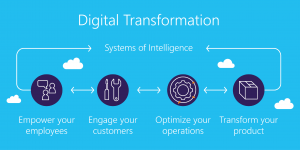“It is not the strongest of species that survive, nor the most intelligent but the one most responsive to change.”
~ Charles Darwin
Over the last few year, the technological advancements achieved has been nothing short of staggering. These advancements have changed the way the world runs and the way we live and interact. It has also changed the way businesses are run and gave birth to a term; Digital Transformation.
What is Digital Transformation?
Digital transformation varies for every company. However, we can define digital transformation as the integration of digital technology into all areas of a business resulting in fundamental changes to how businesses operate and how they deliver value to customers. In simpler terms, it is modernizing a business to adapt to the digital world. It is a scary term for CEO’s to think about. It requires organizations to experiment, accept failure regularly and constantly challenge the status quo. This means organizations would have to ditch certain long-standing business processes for new and modern practices.
Why is Digital Transformation Important?
The answer is quite simple; survival. If your organization does not adapt to the modern world then you run the risk of getting left behind. In addition, the threat of disruption becomes very real, very fast. Organizations not founded within the last 10 years face this risk. This is because they are probably using software and IT infrastructure that is out of date and irrelevant. Furthermore, your competitors, who have embraced digital transformation are now more efficient and engaging their customers across multiple platforms.
Let’s take a look at the humble Malaysian taxi driver as a case study. In the past, taxi drivers would rely on their own knowledge of the streets of Kuala Lumpur to navigate. However, applications like Waze and Google Maps have changed the game. Drivers no longer need to rely on personal knowledge of traffic patterns or side roads to find the best route but simply tap “Go”. The efficiency rate really adds up when you incorporate technology into every business process.
4 Pillars of Digital Transformation

What does digital transformation consist of? Engaging customers, empowering employees, optimizing operations and transforming products the four pillars of digital transformation.
Engage Customers
Customers are the bread and butter of every business. As such, it strengthening those relationships should be of the utmost importance. It can determine if the organization grows and flourishes or struggles and falls. Customers always expect a quality experience when dealing with businesses. Customer experience (CX) could be the element that differentiates your organization from the rest. As such, focusing on and improving customer experiences and satisfaction through data analysis is key to engage customers. Business results will follow once this is done.
Empower Employees
Employees are the wheels of an organization. They keep the company moving. As such, it is imperative to empower your employees to deliver their best. How? By creating an intelligent and flexible environment that encourages partnerships. Furthermore, studies show that by adopting methods that promote high workplace mobility, employees become more productive and engaged. An organization is able to concentrate on growing its business once digital transformation is incorporated within its employees.
Optimize Operations
Efficiency is key in every business. Constantly evaluate business processes to check if it’s running at optimum efficiency. In addition, identify ways to save costs and improve the responsiveness of your organization. Find better ways to create efficiency throughout your organization.
Transform Products
The last pillar in Digital Transformation is Transform Products. This term includes products and services. Organizations should constantly use technology to help transform their products and services. Those that do not are going to be left behind. Furthermore, through data analysis, capture and differentiate emerging opportunities.
In conclusion, all organizations should jump on board the digital transformation bus. It is clear why digital transformation is important. An organization could go from a position of power to one of vulnerability in a second if they don’t adapt. However, the problem with digital transformation is the uncertainty it brings. This can be scary for a large organization. Aside from the amount of time and effort that would be required to implement these changes be significant, redefining a business model/s means high-risk. This is where Gameka can help. We believe in preparing and training organizations for the Information Age by providing personalized solutions and world-class ideas. We provide gamification services to bring fun back to the workplace through mobile applications. Furthermore, we also specialize in providing software and technology solutions.





About The Author: Luke@gameka.my
More posts by luke@gameka.my